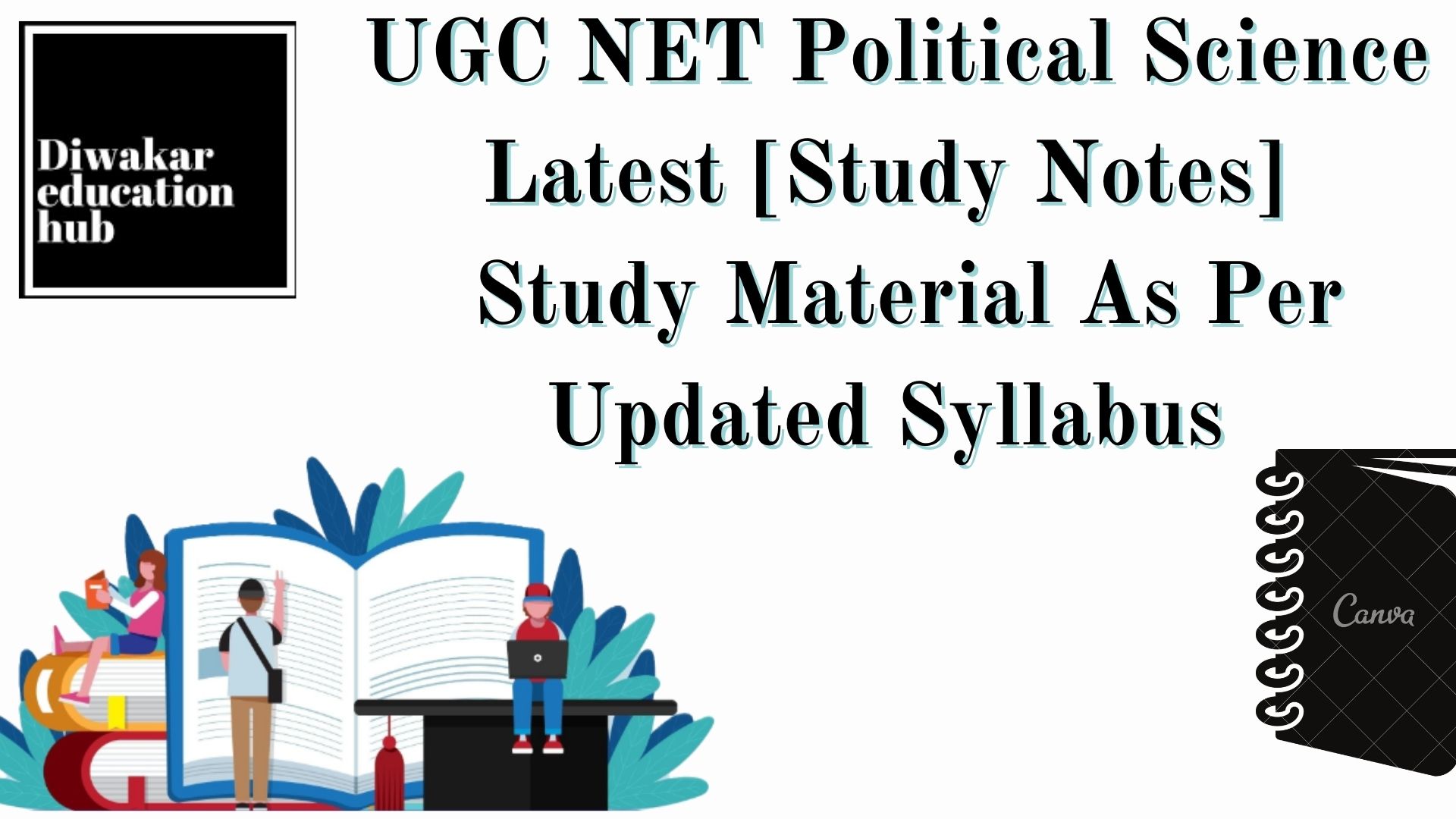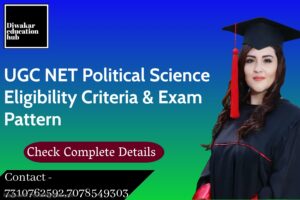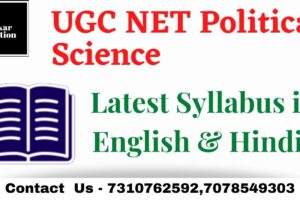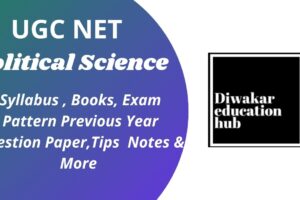UGC NET Political Science Complete Study Notes [Study Material] All Units/Topics in[Hindi & English] As per Updated Syllabus 2024

UGC NET Political Science Complete Study Notes [Books] in Hindi & English Medium After Analysis of the Syllabus You Need Best Study Notes (Books) to Prepare for Exam. In Our Notes, Each & Every Topic was Covered in Detail with the Expected MCQ. In Political Science Syllabus you have to Learn in Detail Cover each subject & topic in detail & after the topics Need Expected Question Answers to Practice. To Check all Details & processes Click on Below Links Unit wise
Here are the Complete Study Notes of UGC NET Political Science As Per the New Updated Syllabus Cover All 10 Units, Before Start Preparing You should Read Syllabus Thoroughly to Know All Topics & Subjects
Table of Contents
Highlights of the UGC NET Political Science 2024 Exam
| Particulars | Details |
| Name of the Exam | National Eligibility Test (NET) |
| Conducting Body | National Testing Agency (NTA) |
| Frequency of the Exam | Twice a Year |
| Mode of Examination | Online |
| Type of Questions | Multiple Choice Questions (MCQs) |
| Number of Papers | Paper I Paper II |
| Number of Questions | 150 |
| Time Duration | 3 hours |
| Negative Marking | No |
| Official Website | ugcnet.nta.ni |
| Subject | Political Science |
Here is the Process of Study Notes of UGC NET Political Science 2024 –
| Political Science Topics /Units | Process to Read |
|---|---|
| Unit – 1 : Political Theory | https://wa.link/3awl0f |
| Unit – 2 : Political Thought | https://wa.link/3awl0f |
| Unit – 3 : Indian Political Thought | https://wa.link/3awl0f |
| Unit – 4 : Comparative Political Analysis | https://wa.link/3awl0f |
| Unit – 5 : International Relations | https://wa.link/3awl0f |
| Unit – 6 : India’s Foreign Policy | https://wa.link/3awl0f |
| Unit – 7 : Political Institutions in India | https://wa.link/3awl0f |
| Unit – 8 : Political Processes in India | https://wa.link/3awl0f |
| Unit – 9 : Public Administration | https://wa.link/3awl0f |
| Unit – 10 : Governance and Public Policy in India | https://wa.link/3awl0f |
| Total Units | 10 |
UGC NET Political Science Study Notes in Hindi 2024-
UGC NET Political Science Study Notes In Hindi As per Updated Syllabus 2024
| Political Science Topics /Units in Hindi | Link to Read |
|---|---|
| यूनिट -1: राजनीतिक सिद्धांत | https://wa.link/wt8nld |
| यूनिट – 2 : राजनीतिक विचार | https://wa.link/wt8nld |
| यूनिट – 3: भारतीय राजनीतिक विचार | https://wa.link/wt8nld |
| यूनिट -4: तुलनात्मक राजनीतिक विश्लेषण | https://wa.link/wt8nld |
| यूनिट – 5 : अंतर्राष्ट्रीय संबंध | https://wa.link/wt8nld |
| यूनिट – 6: भारत की विदेश नीति | https://wa.link/wt8nld |
| यूनिट – 7: भारत में राजनीतिक संस्थान | https://wa.link/wt8nld |
| यूनिट – 8: भारत में राजनीतिक प्रक्रियाएं | https://wa.link/wt8nld |
| यूनिट – 9: लोक प्रशासन | https://wa.link/wt8nld |
| यूनिट -10: भारत में शासन और सार्वजनिक नीति | https://wa.link/wt8nld |
| Total Units | 10 |
UGC NET Political Science Latest Syllabus-
| Units | Subject/Topic Name |
| Unit – 1 : Political Theory | Concepts Liberty, Equality, Justice, Rights, Democracy, Power, Citizenship, Political Traditions Liberalism Conservatism Socialism Marxism Feminism Ecologism Multiculturalism Postmodernism |
| Unit – 2 : Political Thought | Confucius, Plato, Aristotle, Machiavelli, Hobbes, Locke, Rousseau, Hegel, Mary Wollstonecraft, John Stuart Mill, Karl Marx, Gramsci, Hannah Arendt, Frantz Fanon, Mao Zedong, John Rawls |
| Unit – 3 : Indian Political Thought | Dharamshastra, Kautilya, Aggannasutta, Barani, Kabir, Pandita Ramabai, Bal Gangadhar Tilak, Swami Vivekanand, Rabindranath Tagore, M.K Gandhi, Sri Aurobindo, Periyar E. V. Ramasamy, Muhammad Iqbal, M.N.Roy, V D Savarkar, Dr. B.R.Ambedkar, J L Nehru, Ram Manohar Lohia, Jaya Prakash Narayan, Deendayal Upadhyaya |
| Unit – 4 : Comparative Political Analysis | Approaches: Institutional, Political Culture, Political Economy and New Institutionalism; Comparative Methods Colonialism and decolonization: forms of colonialism, anti-colonial struggles and decolonization Nationalism: European and non-European. State theory: debate over the nature of state in capitalist and socialist societies; post-colonial state; welfare state; globalization and nations-states Political regimes: democratic (Electoral, Liberal, Majoritarian and Participatory) and non-democratic regimes (Patrimonialism, Bureaucratic authoritarianism, Military dictatorship, Totalitarianism, and fascist). Constitutions and Constitutionalism: forms of constitutions, rule of law, judicial independence and liberal constitutionalism; emergency powers and crisis of constitutionalism. Democratisation: democratic transition and consolidation. Development: Underdevelopment, Dependency, Modernization, World Systems Theory, development and democracy. Structures of Power: ruling class, power elites, democratic elitism Actor and Processes: Electoral Systems, Political Parties and Party System, Interest groups, Social movements, new social movements, Non Governmental Organisations (NGOs) and civil society campaigns; Revolutions. |
| Unit – 5 : International Relations | Approaches to the study of International relations: Idealism, Realism, Structural Marxism, Neoliberalism, Neorealism, Social Constructivism, Critical International Theory, Feminism, Postmodernism. Concepts: State, state system and non-state actors, Power, Sovereignty, Security: traditional and non- traditional. Conflict and Peace: Changing Nature of Warfare; Weapons of mass destruction; deterrence; conflict resolution, conflict transformation. United Nations: Aims, Objectives, Structure and Evaluation of the Working of UN; Peace and Development perspectives; Humanitarian intervention. International law; International Criminal Court Political Economy of IR; Globalisation; Global governance and Bretton Woods system, North-South Dialogue, WTO, G-20, BRICS. Regional Organisations: European Union, African Union, Shanghai Cooperation Organisation, ASEAN. Contemporary Challenges: International terrorism, Climate change and Environmental Concerns, Human Rights, Migration and Refugees; Poverty and Development; Role of Religion, Culture and Identity Politics. |
| Unit – 6 : India’s Foreign Policy | Perspectives on India’s Foreign Policy: India’s Identity as postcolonial, development, rising power and as emerging political economy Continuity and change in India’s Foreign Policy: Principles and determinants; Non-Alignment movement: historical background and relevance of Non Aligned Movement; India’s Nuclear Policy India’s relations with major powers: USA, USSR/Russia, People’s Republic of China India’s Engagement with multipolar world: India’s relations with European Union, BRICS, ASEAN, Shanghai Cooperation Organisation, African Union, Southern African Development Community, Gulf Cooperation Council India’s relations with neighbourhood: SAARC, Gujaral doctrine, Look Eas t/ Act East, Look West. India’s Negotiation Strategies in International Regimes: The United Nations, World Trade Organisation, International Monetary Fund, Intergovernmental Panel on Climate Change Contemporary challenges: maritime security, energy security, environmental security, migrants and refugees, water resources, international terrorism, cyber security |
| Unit – 7 : Political Institutions in India | Making of the Indian Constitution: Colonialism heritage and the contribution Indian National Movement to the making of the Indian Constitution Constituent Assembly: Composition, Ideological Moorings, Constitutional Debates Philosophy of the Constitution: Preamble, Fundamental Rights, Directive Principles Constitutionalism in India: Democracy, Social Change, National Unity, Checks and Balances, Basic Structure Debate, Constitutional Amendments Union Executive: President, Prime Minister and Council of Ministers Union Parliament: Structure, Role and Functioning, Parliamentary Committees Judiciary: Supreme Court, High Court, Judicial Review, Judicial Activism, Judicial Reform. Executive and Legislature in the States: Governor, Chief Minister, State Legislature Federalism in India: Strong Centre Framework, Asymmetrical Federal Provisions and Adaption, Role of Intergovernmental Coordination Mechanisms, Inter-State Council, Emerging Trends. Electoral Process and Election Commission of India: Conduct of Elections, Rules, Electoral Reforms. Local Government Institutions: Functioning and reforms. Constitutional and Statutory Bodies: Comptroller and Auditor General, National Commission for Scheduled Castes, National Commission for Scheduled Tribes, National Commission for Human Rights, National Commission for Women, National Commission for Minorities. |
| Unit – 8 : Political Processes in India | State, Economy and Development: Nature of Indian State, Development Planning model, New Economic Policy, Growth and Human Development. Process of globalisation: social and economic implications. Identity Politics: Religion, Tribe, Caste, Region, Language. Social Movements: Dalit, Tribal, Women, Farmers, labour Civil Society Groups: Non-Party Social Formations, Non-Governmental Organisations, Social Action Groups. Regionalisation of Indian Politics: Reorganisation of Indian States, States as Political and Economic Units, Sub-State Regions, Regional disparities, Demand for New States, Gender and Politics in India: Issues of Equality and Representation. Ideology and Social basis of Political Parties: National Parties, State Parties. Electoral Politics: Participation, Contestation, Representation, Emerging trends. |
| Unit – 9 : Public Administration | Public Administration: meaning and evolution; public and private administration Approaches: System Theory, Decision Making, Ecological Approach Public administration theories and concepts: Scientific Management Theory, Rational Choice theory, New Public Administration, Development Administration, Comparative Public Administration, New Public Management, changing nature of Public Administration in the era of liberalisation and Globalisation Theories and Principles of Organization: Scientific Management Theory, Bureaucratic Theory, Human Relations Theory Managing the organization: Theories of leadership and motivation. Organisational Communication: Theories and Principles, Chester Bernard Principles of Communication, Information Management in the organization Managing Conflict in the Organization: Mary Parker Follett Management by Objectives- Peter Drucker |
| Unit – 10 : Governance and Public Policy in India | Governance, good governance and democratic governance, role of state, civil society and individuals. Accountability and control: Institutional mechanism for checks and balances, legislative control over executive, administrative and budgetary control, control through parliamentary committees, judicial control over legislature and executive, administrative culture, corruption and administrative reforms Institutional mechanisms for good governance: Right to Information, Consumer Protection Act, Citizen Charter; Grievance redress system: Ombudsman, Lokpal, Lokayukta Grassroots Governance: Panchayati Raj Institutions and their functioning Planning and Development: Decentralised planning, planning for development, sustainable development, participatory development, e-governance; NITI Aayog Public policy as an instrument of socio-economic development: public policies with special reference to housing, health, drinking water, food security, MNREGA, NHRM, RTE Monitoring and evaluation of public policy; mechanisms of making governance process accountable: jansunwai, social audit |
Career Scope of UGC NET Political Science
Once you qualify the exam, you will get a chance to make your career as an assistant professor/ JRF in various Govt as well as Private Colleges and Universities approved by UGC.
Achieving the UGC NET Certificate is the best way to get these posts in India’s Most Prestigious Universities.
UGC NET Political Science Exam Tips/ Strategy
As you know, the UGC NET Political Science Syllabus is vast. So, make a separate list of topics that you think will need more attention and divide the time accordingly.
According to experts, flowcharts are very efficient in learning something. Using them in your preparation will be one of the best choices for reaching your goal.
Solving UGC NET Political Science Question Papers is mandatory to get an idea about the type of questions asked in the exam
Do weekly Revisions All Topics which you Covered in Week do Revise All in a Weekend
Practice Online Test Series & Analysis your Score
Revise the concept, practice, and solve the paper again.
Take help from your subject teachers to clear the doubts and concepts regarding any topic
Frequently Asked Question’s Political Science (FAQ).
What are the study materials offered by Diwakar Education Hub for the UGC NET Political Science Exam?
Ans- The Diwakar Education Hub offers a complete package of study materials to prepare for the UGC NET Political Science Exam which has 10 Unit Wise Booklets With Theory + Unit Wise 4000+ Question Answers As per Exam Pattern the Details Notes Cover Each & Every Topic of Syllabus.
Why the notes important for UGC NET Political Science Exam?
Ans- Yes, the UGC NET Political Science Notes are very vital for the students to revise the complete portions that they studied for the UGC NET Political Science Exam.
How can the students prepare the UGC NET Political Science Notes?
Ans- Students can prepare the UGC NET Political Science Study material from the UGC NET Political Science Study Materials. They can go for our Notes Thoroughly for the preparation of the UGC NET Political Science Notes.
What kind of books can be used to prepare the UGC NET Political Science Notes?
Ans- There are Many Books Available in the Market but a Single book does Not cover all which you need to cover from an Exam perspective. But a Detailed Study Material Like Have you will get all that you need to crack this Exam.
What are some tips to take notes for the UGC NET Political Science Exam?
Ans-Candidates can go for online searches to get notes for complicated subjects. Candidates can make charts like for remembering the years of the wars. Candidates can make use of several books for a single topic that will improve their understanding. Through all these steps candidates can make their own UGC NET Political Science Notes or Can Choose Our Notes.
| More Details UGC NET Exam | Topics/Article |
| Career Scope UGC NET | UGC National Scholarship |
| UGC NET Exam Date | UGC NET Answer Key 2020 |
| UGC NET Online Application Fee & Procedure | Free Mock Test |
| UGC NET EXAM PATTERN | Admit Card 2021 |
| UGC NET JRF Eligibility Criteria | UGC NET Previous Year Question Paper |
| Still Have Any Query Feel Free to Contact Us | 7310762592,7078549303 |
Tag:arihant ugc net political science pdf download, UGC NET Political Science book in Hindi, ugc net political science handwritten notes, UGC NET Political Science Notes in English, ugc net political science notes in hindi, UGC NET Political Science Notes in PDF UGC NET Political Science book in Hindi, ugc net political science notes pdf free download in english, ugc net political science notes pdf free download in hindi, ugc net political science notes pdf in hindi, UGC NET Political Science Study Material, ugc net political science study material pdf, ugc net political science study notes



